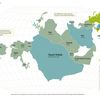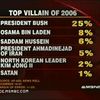27.4.2009 | 11:38
Iceland’s New Government Must Settle Creditor Talks - Bloomberg
By Tasneem Brogger
April 27 (Bloomberg) -- Iceland’s coalition of Social Democrats and Left Greens, which won the weekend’s parliamentary elections, has little time for self-congratulation.
Creditors impatient for repayment and financiers demanding compliance with the terms of an international bailout will be knocking on the door before the champagne runs dry.
The administration takes office as the country awaits the next part of a $5.1 billion International Monetary Fund-led loan. Payment depends on the success of talks over debt owed to creditors of the island’s collapsed banks and failure may derail hopes of economic recovery. The creditors seek to recoup more than $80 billion, almost eight times Iceland’s national output.
“They’re saddled with the same problems,” said Lars Christensen, head of emerging markets at Danske Bank A/S in Copenhagen. “There’s no quick fix. This isn’t a structural problem. They just need to repay their debt.”
Prime Minister Johanna Sigurdardottir’s alliance of Social Democrats and Left Greens won 51.5 percent of the vote on April 25. The Independence Party, blamed by many voters for the island’s economic collapse under former Prime Minister Geir Haarde, got 23.7 percent. Sigurdardottir will meet President Olafur Grimsson at 4 p.m. to discuss the formation of the government.
“New times have arrived,” Sigurdardottir told party members in comments on national broadcaster RUV after early results were announced. The people “are settling the score with the past, with the neo-libertarianism, with the Independence Party which has been in power here for too long.”
Future ‘Vision’
It won’t be long before her coalition has to focus citizens’ minds on the future.
Sigurdardottir has promised to create greater probity and transparency throughout the economy and wants to put the island on course to join the European Union, with euro adoption an ultimate goal.
“This result shows that people want our vision for the future, that they want our plan for the way in to the European Union,” she said as the scale of her victory became clear.
Still, the economic challenges facing the coalition will be first on the agenda, a fact the voters recognize.
“The politicians aren’t talking about the fact that the country has lost its creditworthiness,” said Benedikt Johannesson, managing director of a publishing house, in downtown Reykjavik before the election. “The political parties don’t seem to realize that if we do not take action now, we will have another major blow and the nation will be stuck in a trap of poverty for a long time to come.”
Economic Gloom
The IMF says the economy will shrink 10.6 percent this year and household consumption will plunge by a quarter. Unemployment, lower than 1 percent just over a year ago, surged to 8.9 percent in March, Statistics Iceland said on April 15.
Rising joblessness is exacerbating the plight of households. As many as 30,000 homeowners have negative equity or debt burdens that exceed their property value, excluding car loans and bank overdrafts, Sigurdadottir said last month.
“I see nothing but great difficulties ahead of the new government, regardless of who wins,” said Olafur Th. Hardarson a professor of political science at the University of Iceland, in an interview on April 24. They “probably haven’t told voters how and where they’re going to cut costs and raise taxes.”
Iceland had targeted a settlement with international creditors of the failed, Reykjavik-based banks, Kaupthing Bank hf, Landsbanki Islands hf and Glitnir Bank hf, this month, Gylfi Magnusson, interim business affairs minister, said on March 11.
Likely models would include offering creditors stakes in domestic units of the failed lenders or extending maturities on the debt, Magnusson said. The financial watchdog said on April 16 that talks with the creditors won’t be finished until the second half of May.
‘Stagnate Totally’
Since the failure of the island’s banks, Iceland has been forced to impose capital restrictions to prevent a sell-off of the krona. That means foreign investors with krona-denominated holdings of about 700 billion kronur ($5.4 billion) can’t exit their investments.
“Nobody wants to stick their money in Iceland now,” Christensen said. “But it’s absolutely critical for the economy that Iceland remains open and that its capital markets start to function. Otherwise the economy will stagnate totally, which would be just as catastrophic.”
The headache of resolving international obligations isn’t what motivated most Icelanders to seek a change of government, Christensen said.
Islanders put their faith in parties who pledge more welfare and bigger government, rejecting the free-market policies of the Independence Party that oversaw the failure of the island’s financial system, throwing the nation into the arms of the IMF.
“It was high time that the voters were given a chance to vent their anger, and the international investment community just has to live with that,” said Christensen. “The election result is also completely natural.”
To contact the reporter on this story: Tasneem Brogger in Copenhagen at tbrogger@bloomberg.net
Last Updated: April 27, 2009 06:56 EDTUm bloggiš
Baldur Fjölnisson
Nżjustu fęrslur
- Torfi Stefįns bannašur ęvilangt
- OL ķ skįk. Landinn malaši Kenķu ķ 9. umferš
- OL ķ skįk: Landinn ķ 88. sęti eftir 8 umferšir
- Mešaljónar ķ skįkinni
- Baggalśtur - Sagan af Jesśsi
- Eitraš fyrir lżšnum?
- Óvenjulega döpur taflmennska innfęddra einkennir Reyjavķkursk...
- U.S. Rushes Coolant to Japanese Nuke Plant After Earthquake
Heimsóknir
Flettingar
- Ķ dag (12.9.): 1
- Sl. sólarhring: 3
- Sl. viku: 7
- Frį upphafi: 116495
Annaš
- Innlit ķ dag: 1
- Innlit sl. viku: 5
- Gestir ķ dag: 1
- IP-tölur ķ dag: 1
Uppfęrt į 3 mķn. fresti.
Skżringar
Bloggvinir
-
 Agný
Agný
-
 Alfreð Símonarson
Alfreð Símonarson
-
 Andrea J. Ólafsdóttir
Andrea J. Ólafsdóttir
-
 Bjarni Harðarson
Bjarni Harðarson
-
 Bjarni Kjartansson
Bjarni Kjartansson
-
 Björgvin Gunnarsson
Björgvin Gunnarsson
-
 Brynjar Jóhannsson
Brynjar Jóhannsson
-
 FLÓTTAMAÐURINN
FLÓTTAMAÐURINN
-
 Eygló Þóra Harðardóttir
Eygló Þóra Harðardóttir
-
 FreedomFries
FreedomFries
-
 Fríða Eyland
Fríða Eyland
-
 Félag um stafrænt frelsi á Íslandi
Félag um stafrænt frelsi á Íslandi
-
 Georg P Sveinbjörnsson
Georg P Sveinbjörnsson
-
 Gestur Guðjónsson
Gestur Guðjónsson
-
 Gils N. Eggerz
Gils N. Eggerz
-
 Gullvagninn
Gullvagninn
-
 Gunnar Skúli Ármannsson
Gunnar Skúli Ármannsson
-
 Guðrún María Óskarsdóttir.
Guðrún María Óskarsdóttir.
-
 Gísli Hjálmar
Gísli Hjálmar
-
 Hagbarður
Hagbarður
-
 Halla Rut
Halla Rut
-
 Haraldur Haraldsson
Haraldur Haraldsson
-
 Hilmar Kári Hallbjörnsson
Hilmar Kári Hallbjörnsson
-
 Hlekkur
Hlekkur
-
 Ingibjörg Álfrós Björnsdóttir
Ingibjörg Álfrós Björnsdóttir
-
 Jens Guð
Jens Guð
-
 Jóhannes Ragnarsson
Jóhannes Ragnarsson
-
 Jón Aðalsteinn Jónsson
Jón Aðalsteinn Jónsson
-
 Jón Ragnarsson
Jón Ragnarsson
-
 Jón Steinar Ragnarsson
Jón Steinar Ragnarsson
-
 Jónína Benediktsdóttir
Jónína Benediktsdóttir
-
 Karl Tómasson
Karl Tómasson
-
 Kári Magnússon
Kári Magnússon
-
 Loopman
Loopman
-
 Magnús Þór Hafsteinsson
Magnús Þór Hafsteinsson
-
 Promotor Fidei
Promotor Fidei
-
 Rúnar Sveinbjörnsson
Rúnar Sveinbjörnsson
-
 Salvör Kristjana Gissurardóttir
Salvör Kristjana Gissurardóttir
-
 Sandra María Sigurðardóttir
Sandra María Sigurðardóttir
-
 SeeingRed
SeeingRed
-
 Sigurbjörn Friðriksson
Sigurbjörn Friðriksson
-
 Sigurjón Þórðarson
Sigurjón Þórðarson
-
 Sigurður Þórðarson
Sigurður Þórðarson
-
 Snorri Hrafn Guðmundsson
Snorri Hrafn Guðmundsson
-
 el-Toro
el-Toro
-
 Sveinn Ingi Lýðsson
Sveinn Ingi Lýðsson
-
 Tryggvi Hjaltason
Tryggvi Hjaltason
-
 TómasHa
TómasHa
-
 Túrilla
Túrilla
-
 Upprétti Apinn
Upprétti Apinn
-
 gudni.is
gudni.is
-
 haraldurhar
haraldurhar
-
 proletariat
proletariat
-
 Ívar Pálsson
Ívar Pálsson
-
 Ómar Ragnarsson
Ómar Ragnarsson
-
 Ónefnd
Ónefnd
-
 Óskar
Óskar
-
 Óskar Helgi Helgason
Óskar Helgi Helgason
-
 Óskar Þ. G. Eiríksson
Óskar Þ. G. Eiríksson
-
 Þórir Kjartansson
Þórir Kjartansson
-
 Arnar Guðmundsson
Arnar Guðmundsson
-
 Bara Steini
Bara Steini
-
 Birgir R.
Birgir R.
-
 Birgir Rúnar Sæmundsson
Birgir Rúnar Sæmundsson
-
 brahim
brahim
-
 Brosveitan - Pétur Reynisson
Brosveitan - Pétur Reynisson
-
 Bwahahaha...
Bwahahaha...
-
 Dingli
Dingli
-
 eysi
eysi
-
 Gestur Kristmundsson
Gestur Kristmundsson
-
 Guðbjörg Elín Heiðarsdóttir
Guðbjörg Elín Heiðarsdóttir
-
 Gunnar Helgi Eysteinsson
Gunnar Helgi Eysteinsson
-
 Gunnar Rögnvaldsson
Gunnar Rögnvaldsson
-
 Helgi Jóhann Hauksson
Helgi Jóhann Hauksson
-
 Hlini Melsteð Jóngeirsson
Hlini Melsteð Jóngeirsson
-
 Jakobína Ingunn Ólafsdóttir
Jakobína Ingunn Ólafsdóttir
-
 Katrín Snæhólm Baldursdóttir
Katrín Snæhólm Baldursdóttir
-
 kreppukallinn
kreppukallinn
-
 Kristín Magdalena Ágústsdóttir
Kristín Magdalena Ágústsdóttir
-
 Máni Ragnar Svansson
Máni Ragnar Svansson
-
 Morgunblaðið
Morgunblaðið
-
 Neo
Neo
-
 Orgar
Orgar
-
 Ragnar L Benediktsson
Ragnar L Benediktsson
-
 Rauði Oktober
Rauði Oktober
-
 Skákfélagið Goðinn
Skákfélagið Goðinn
-
 Sveinn Þór Hrafnsson
Sveinn Þór Hrafnsson
-
 Vilhjálmur Árnason
Vilhjálmur Árnason
-
 Þór Ludwig Stiefel TORA
Þór Ludwig Stiefel TORA




Bęta viš athugasemd [Innskrįning]
Ekki er lengur hęgt aš skrifa athugasemdir viš fęrsluna, žar sem tķmamörk į athugasemdir eru lišin.